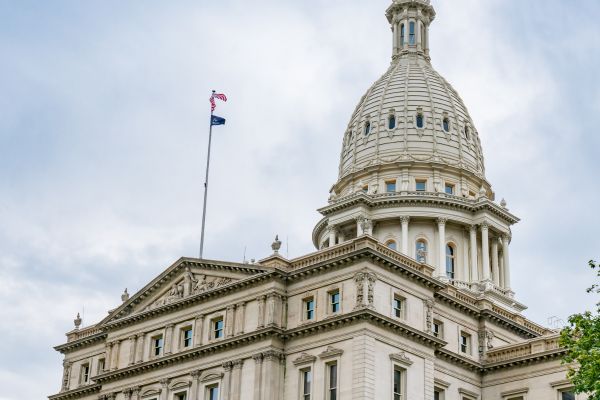
- Details
- By Neely Bardwell
LANSING, Mich. — Today in Michigan, lawmakers are introducing a wave of bills that seek to improve the lives of Native Americans and announcing plans for the first powwow ceremony to take place on the state capitol grounds.
The package of bills, “Michigan Indigenous Culture and Heritage Package,” — introduced by six state representatives, including Carrie A. Rheingans (D-Ann Arbor), Samantha Steckloff (D-Farmington Hills), and Helena Scott (D-Detroit) — aims to address issues that have affected Indian Country for years.
Rheingans said the bills were written with input from Michigan’s Native communities.
“I came to Lansing to work on policy that uplifts historically excluded groups,” Rheingans said in a statement. “I have always believed that the best policy should be driven by the people most impacted. Indigenous people in Michigan told us what they wanted us to work on, and we are working with Indigenous leaders to deliver for them.”
Two of the bills from the package, HB4853 and HB4854, are designed to protect the rights of Indigenous students wearing ceremonial regalia at graduation ceremonies and those who wear traditional regalia or bring cultural objects to their schools and universities.
As well, HB4855 and HB4856 would add members to the Michigan Wolf Management Advisory Council and Michigan Wildlife Council with the goal of adding tribal voices and perspectives to the councils.
Another introduced bill, HB4852, would declare Manoomin, or wild rice, as the state’s official native grain. Designating wild rice as the state grain will enable Michigan to create a stewardship plan to protect the cultivation of wild rice.
The remaining bills in the package would protect Michigan’s pollinators and vital plants. HB4857 would make milkweeds exempt from the designation of noxious plants, ensuring the plant would no longer subject to state and local eradication efforts.
Lastly, HB4858 would prohibit the use of neonicotinoid pesticides on public land and require the Michigan Department of Agriculture and Rural Development to produce a report to the legislature detailing the costs and benefits of the use of the pesticides.
The new bills have been praised by members of the Michigan Native community, including University of Michigan professor and tribal citiizen of the Citizen Potawatomi Nation Kyle Whyte.
“The new bills are a powerful spark for protecting the health, well-being, and cultural integrity of Anishinaabe people in Michigan, and empower our voices on significant issues that affect our lives,” Whyte said in a statement. “At the same time, these bills show how Anishinaabe peoples’ solutions in the state will benefit Michiganders broadly, fostering clean, safe, and healthy environments for all to steward and safeguard these lands and waters.”
To commemorate the bills, Rheingans and Witwer's offices, along with Witwer’s legislative aid Yvonne Fronczak (Little Traverse Bay Band of Odawa Indians), are planning the first powwow celebration on the capitol lawn, set to take place on Michigan Indian Day, Sept. 22. As well, on Sept. 21, the Anishinaabek Caucus of the Michigan Democratic Party will be hosting a lobby day in Lansing to urge legislators to support the package of bills introduced today and future legislation. Witwer’s legislative aid Yvonne Fronczak (Little Traverse Bay Band of Odawa Indians), has taken the lead in planning both events alongside the Michigan Indigenous Culture and Heritage (MICH) Committee.
“The MICH Committee, in partnership with the Anishinaabek Caucus, is dedicated to uplifting and celebrating our Native communities, uniting them at the capitol,” the Committee said in a statement. “This is an opportunity to educate and celebrate our Elders who have tirelessly fought and advocated for our native rights. It is also a crucial moment to impart knowledge to the next generation, equipping them to become advocates for our Native Issues.”
Fronczak is hoping the events will inspire a new generation of advocates for Native issues.
“We are planning a powwow and an Anishinaabek lobby day in September to bring together all Native communities in Michigan to celebrate and educate,” Fronczak said. “Our elders were our advocates, and now it’s time to teach our next generation to be advocates, too.”
More Stories Like This
Native News Weekly (August 25, 2024): D.C. BriefsNative Bidaské: The Illusion of Freedom and the Myth of America 250, Leonard Peltier Speaks Out
Monday Morning (March 2, 2026): Articles You May Have Missed This Past Weekend
Native News Weekly (March 1, 2026): D.C. Briefs
Scope Narrowed, Report Withheld: Questions Mount Over Michigan Boarding School Study
Help us defend tribal sovereignty.
At Native News Online, our mission is rooted in telling the stories that strengthen sovereignty and uplift Indigenous voices — not just at year’s end, but every single day.
Because of your generosity last year, we were able to keep our reporters on the ground in tribal communities, at national gatherings and in the halls of Congress — covering the issues that matter most to Indian Country: sovereignty, culture, education, health and economic opportunity.
That support sustained us through a tough year in 2025. Now, as we look to the year ahead, we need your help right now to ensure warrior journalism remains strong — reporting that defends tribal sovereignty, amplifies Native truth, and holds power accountable.
 The stakes couldn't be higher. Your support keeps Native voices heard, Native stories told and Native sovereignty defended.
The stakes couldn't be higher. Your support keeps Native voices heard, Native stories told and Native sovereignty defended.
Stand with Warrior Journalism today.
Levi Rickert (Potawatomi), Editor & Publisher


